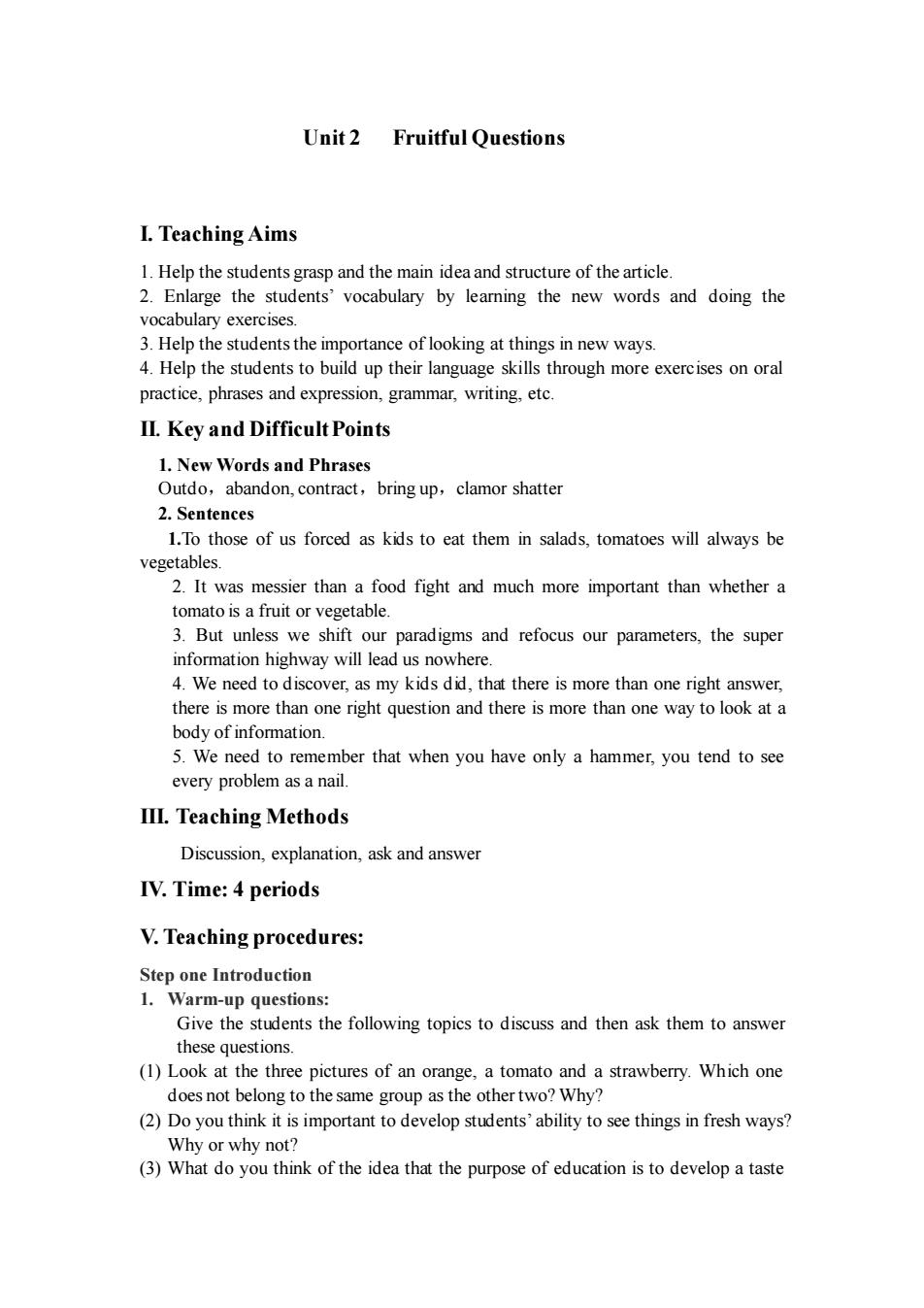
Unit 2 Fruitful Questions I.Teaching Aims 1.Help the students grasp and the main ideaand structure of the article 2.Enlarge the students'vocabulary by leaming the new words and doing the vocabulary exercises 3.Help the students the importance of looking at things in new ways. 4.Help the students to build up their language skills through more exercises on oral practice,phrases and expression,grammar,writing.etc. II.Key and Difficult Points 1.New Words and Phrases Outdo,abandon,contract,bring up,clamor shatter 2.Sentences 1.To those of us forced as kids to eat them in salads,tomatoes will always be vegetables 2.It was messier than a food fight and much more important than whether a tomato is a fruit or vegetable. 3.But unless we shift our paradigms and refocus our parameters,the super information highway will lead us n where 4.We need to discover,as my kids did,that there is more than one right answer. there is more than one right question and there is more than one way to look at a body of information. 5.We need to remember that when you have only a hammer,you tend to see every problem as a nail. III.Teaching Methods Discussion,explanation,ask and answer IV.Time:4 periods V.Teaching procedures: Step one Introduction 1.Warm-up questions: Give the students the following topics to discuss and then ask them to answer these questions (1)Look at the three pictures of a.Which does not belong to the same group as the other two?Why? (2)Do you think it is important to develop students'ability to see things in fresh ways? Why or why not? (3)What do you think of the idea that the purpose of education is to develop a taste
Unit 2 Fruitful Questions I. Teaching Aims 1. Help the students grasp and the main idea and structure of the article. 2. Enlarge the students’ vocabulary by learning the new words and doing the vocabulary exercises. 3. Help the studentsthe importance of looking at things in new ways. 4. Help the students to build up their language skills through more exercises on oral practice, phrases and expression, grammar, writing, etc. II. Key and Difficult Points 1. New Words and Phrases Outdo,abandon, contract,bring up,clamor shatter 2. Sentences 1.To those of us forced as kids to eat them in salads, tomatoes will always be vegetables. 2. It was messier than a food fight and much more important than whether a tomato is a fruit or vegetable. 3. But unless we shift our paradigms and refocus our parameters, the super information highway will lead us nowhere. 4. We need to discover, as my kids did, that there is more than one right answer, there is more than one right question and there is more than one way to look at a body of information. 5. We need to remember that when you have only a hammer, you tend to see every problem as a nail. III. Teaching Methods Discussion, explanation, ask and answer IV. Time: 4 periods V. Teaching procedures: Step one Introduction 1. Warm-up questions: Give the students the following topics to discuss and then ask them to answer these questions. (1) Look at the three pictures of an orange, a tomato and a strawberry. Which one does not belong to the same group as the other two? Why? (2) Do you think it is important to develop students’ ability to see things in fresh ways? Why or why not? (3) What do you think of the idea that the purpose of education is to develop a taste
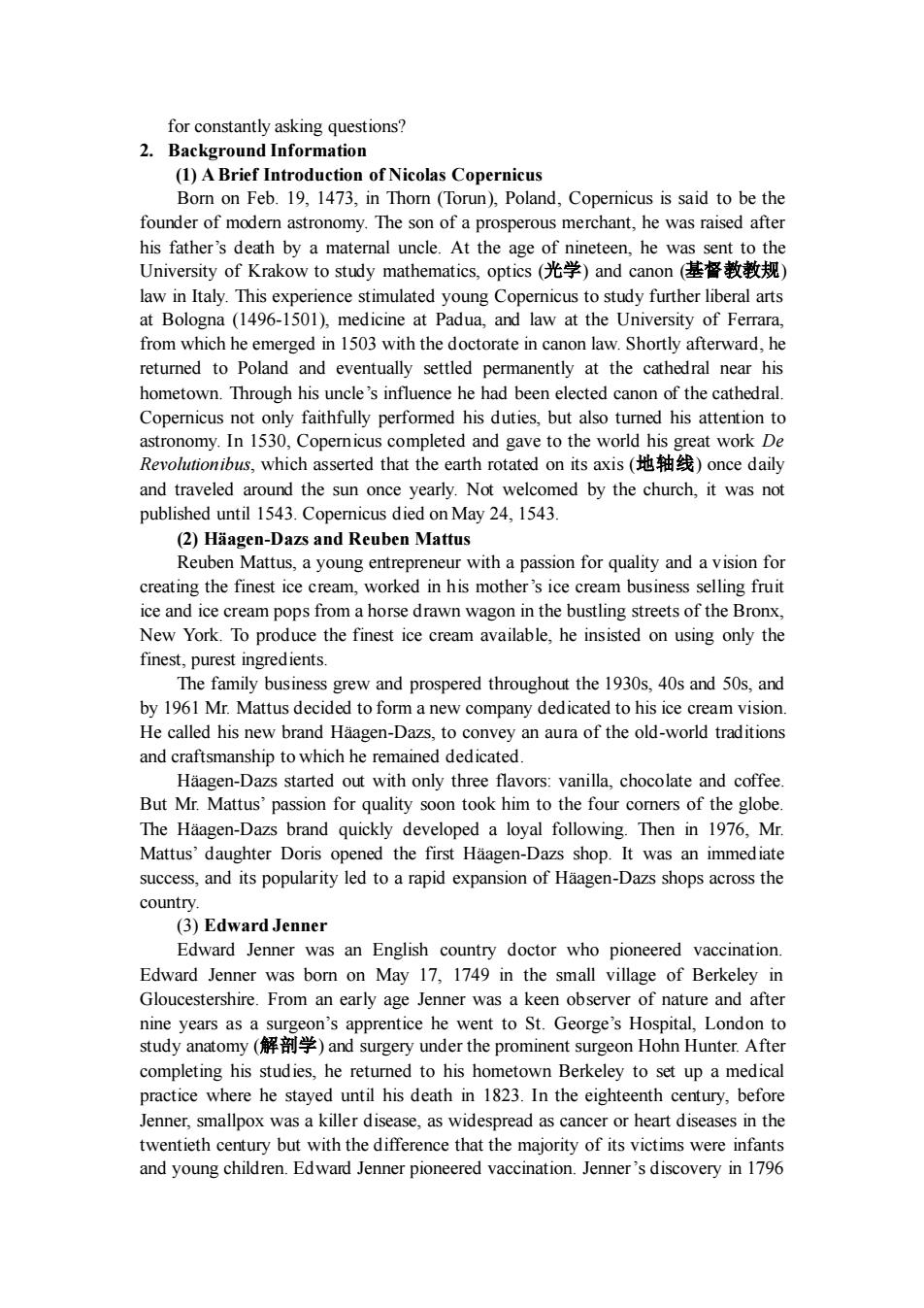
2.Background Information (1)A Brief Introduction of Nicolas Copernicus Born on Feb.19.1473,in Thorn (Torun).Poland,Copernicus is said to be the founder of modern astronomy.The son of a prosperous merchant,he was raised after his father's death by a maternal uncle.At the age of nineteen,he was sent to the y of Krakow to study ma matics,.optics(光学)and 1 canon基督教教规 law in Italy.This experience stimulated young Copernicus to study further liberal arts at Bologna (1496-1501),medicine at Padua,and law at the University of Ferrara, from which he emerged in 1503 with the doctorate in canon law.Shortly afterward,he returned to Poland and eventually settled permanently at the cathedral near his hometown.Throu s uncle's influence he had hee elected canon of the cathedral astronomy.In 1530,Copernicus completed and gave to the world h sgreat work De Revolutionibus,which asserted that the earth rotated on its axis once daily and traveled around the sun once yearly.Not welcomed by the church,it was not published until 1543.Copernicus died on May 24.1543. (2)Haagen-Dazs and Reuben Mattus Reuben Mattus,a young entrepreneur with a passion for quality and a vision for creating the finest ice cream,worked in his mother's ice cream business selling fruit ice and ice cream pops from a horse drawn wagon in the bustling streets of the Bronx, New York.To produce the finest ice cream available,he insisted on using only the finest purest The family business grew and prospered throughout the 1930 ,40s and 50s,and by 1961 Mr.Mattus decided to form a new company dedicated to his ice cream vision. He called his new brand Haagen-Dazs,to convey an aura of the old-world traditions and craftsmanship to which he remained dedicated. Haag Da But Mr Mattu started out with only three fla vanilla,chocolate and coffec pas ssion for quality soon to ok im to the four cm of the glob The Haagen-Dazs brand quickly developed a loyal following.Then in 1976,Mr Mattus'daughter Doris opened the first Haagen-Dazs shop.It was an immediate success,and its popularity led to a rapid expansion of Haagen-Dazs shops across the (3)Edward Jenner Edward Jenner was an English country doctor who pioneered vaccination Edward Jenner was born on May 17,1749 in the small village of Berkeley in Gloucestershire.From an early age Jenner was a keen observer of nature and after ery under the pr eon Hohn Hunter.After completing his studies,he returned to his hometown Berkeley to set up a medic practice where he stayed until his death in 1823.In the eighteenth century.before Jenner,smallpox was a killer disease,as widespread as cancer or heart diseases in the twentieth century but with the difference that the majority of its victims were infants and young children.Edward Jenner pioneered vaccination.Jenner's discovery in 179
for constantly asking questions? 2. Background Information (1) A Brief Introduction of Nicolas Copernicus Born on Feb. 19, 1473, in Thorn (Torun), Poland, Copernicus is said to be the founder of modern astronomy. The son of a prosperous merchant, he was raised after his father’s death by a maternal uncle. At the age of nineteen, he was sent to the University of Krakow to study mathematics, optics (光学) and canon (基督教教规) law in Italy. This experience stimulated young Copernicus to study further liberal arts at Bologna (1496-1501), medicine at Padua, and law at the University of Ferrara, from which he emerged in 1503 with the doctorate in canon law. Shortly afterward, he returned to Poland and eventually settled permanently at the cathedral near his hometown. Through his uncle’s influence he had been elected canon of the cathedral. Copernicus not only faithfully performed his duties, but also turned his attention to astronomy. In 1530, Copernicus completed and gave to the world his great work De Revolutionibus, which asserted that the earth rotated on its axis (地轴线) once daily and traveled around the sun once yearly. Not welcomed by the church, it was not published until 1543. Copernicus died on May 24, 1543. (2) Häagen-Dazs and Reuben Mattus Reuben Mattus, a young entrepreneur with a passion for quality and a vision for creating the finest ice cream, worked in his mother’s ice cream business selling fruit ice and ice cream pops from a horse drawn wagon in the bustling streets of the Bronx, New York. To produce the finest ice cream available, he insisted on using only the finest, purest ingredients. The family business grew and prospered throughout the 1930s, 40s and 50s, and by 1961 Mr. Mattus decided to form a new company dedicated to his ice cream vision. He called his new brand Häagen-Dazs, to convey an aura of the old-world traditions and craftsmanship to which he remained dedicated. Häagen-Dazs started out with only three flavors: vanilla, chocolate and coffee. But Mr. Mattus’ passion for quality soon took him to the four corners of the globe. The Häagen-Dazs brand quickly developed a loyal following. Then in 1976, Mr. Mattus’ daughter Doris opened the first Häagen-Dazs shop. It was an immediate success, and its popularity led to a rapid expansion of Häagen-Dazs shops across the country. (3) Edward Jenner Edward Jenner was an English country doctor who pioneered vaccination. Edward Jenner was born on May 17, 1749 in the small village of Berkeley in Gloucestershire. From an early age Jenner was a keen observer of nature and after nine years as a surgeon’s apprentice he went to St. George’s Hospital, London to study anatomy (解剖学) and surgery under the prominent surgeon Hohn Hunter. After completing his studies, he returned to his hometown Berkeley to set up a medical practice where he stayed until his death in 1823. In the eighteenth century, before Jenner, smallpox was a killer disease, as widespread as cancer or heart diseases in the twentieth century but with the difference that the majority of its victims were infants and young children. Edward Jenner pioneered vaccination. Jenner’s discovery in 1796
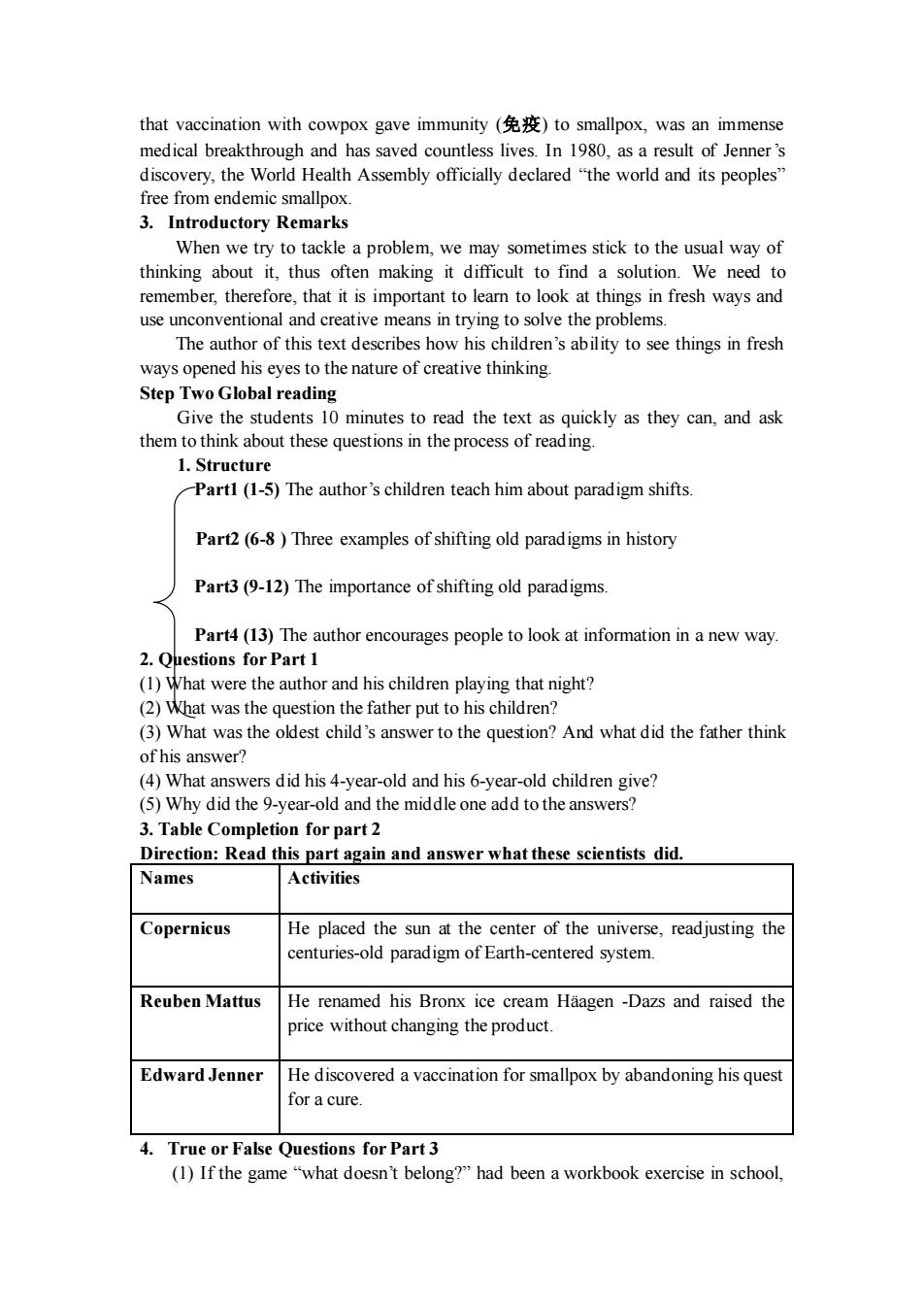
that vaccination with cowpox gave immunity (to smallpox,was an immense medical breakthrough and has saved lives.of Assembly officially declaredthe world and its peoples" free from endemic smallpox. 3.Introductory Remarks When we try to tackle a problem.we may sometimes stick to the usual way of thinking about it,thus often making it difficult to find a solution.We neec remember,therefo hat it is important to leam to loo at things in fresh ways and use unconventional and creative means in trying to solve the problems. The author of this text describes how his children's ability to see things in fresh ways opened his eyes to the nature of creative thinking. Step Two Global reading Giv students 10 minutes to read the text as quickly as they can,and ask 1.Structure Partl(1-5)The author's children teach him about paradigm shifts. Part2(6-8)Three examples of shifting old paradigms in history Part3(9-12)The importance of shifting old paradigms. Part4(13)The author encourages people to look at information in a new way. 2.Questions for Part 1 (2)What was the question the father put to his children? (3)What was the oldest child's answer to the question?And what did the father think of his answer? (4)What answers did his 4-year-old and his 6-year-old children give? (5)Why did the 9- r-old and the middle one add to the answers? 3.Table Completion for part 2 Direction:Read this part again and answer what these scientists did. Names Activities Copernicus He placed the sun at the center of the universe,readjusting the centuries-old paradigm of Earth-centered system. Reuben Mattus I He renamed his Bronx ice cream Haagen -Dazs and raised the price without changing the product. Edward Jenner He discovered a vaccination for smallpox by abandoning his quest for a cure. 4.True or False Questions for Part 3 (1)If the game"what doesn't belong?"had been a workbook exercise in school
that vaccination with cowpox gave immunity (免疫) to smallpox, was an immense medical breakthrough and has saved countless lives. In 1980, as a result of Jenner’s discovery, the World Health Assembly officially declared “the world and its peoples” free from endemic smallpox. 3. Introductory Remarks When we try to tackle a problem, we may sometimes stick to the usual way of thinking about it, thus often making it difficult to find a solution. We need to remember, therefore, that it is important to learn to look at things in fresh ways and use unconventional and creative means in trying to solve the problems. The author of this text describes how his children’s ability to see things in fresh ways opened his eyes to the nature of creative thinking. Step Two Global reading Give the students 10 minutes to read the text as quickly as they can, and ask them to think about these questions in the process of reading. 1. Structure Part1 (1-5) The author’s children teach him about paradigm shifts. Part2 (6-8 ) Three examples of shifting old paradigms in history Part3 (9-12) The importance of shifting old paradigms. Part4 (13) The author encourages people to look at information in a new way. 2. Questions for Part 1 (1) What were the author and his children playing that night? (2) What was the question the father put to his children? (3) What was the oldest child’s answer to the question? And what did the father think of his answer? (4) What answers did his 4-year-old and his 6-year-old children give? (5) Why did the 9-year-old and the middle one add to the answers? 3. Table Completion for part 2 Direction: Read this part again and answer what these scientists did. Names Activities Copernicus He placed the sun at the center of the universe, readjusting the centuries-old paradigm of Earth-centered system. Reuben Mattus He renamed his Bronx ice cream Häagen -Dazs and raised the price without changing the product. Edward Jenner He discovered a vaccination for smallpox by abandoning his quest for a cure. 4. True or False Questions for Part 3 (1) If the game “what doesn’t belong?” had been a workbook exercise in school
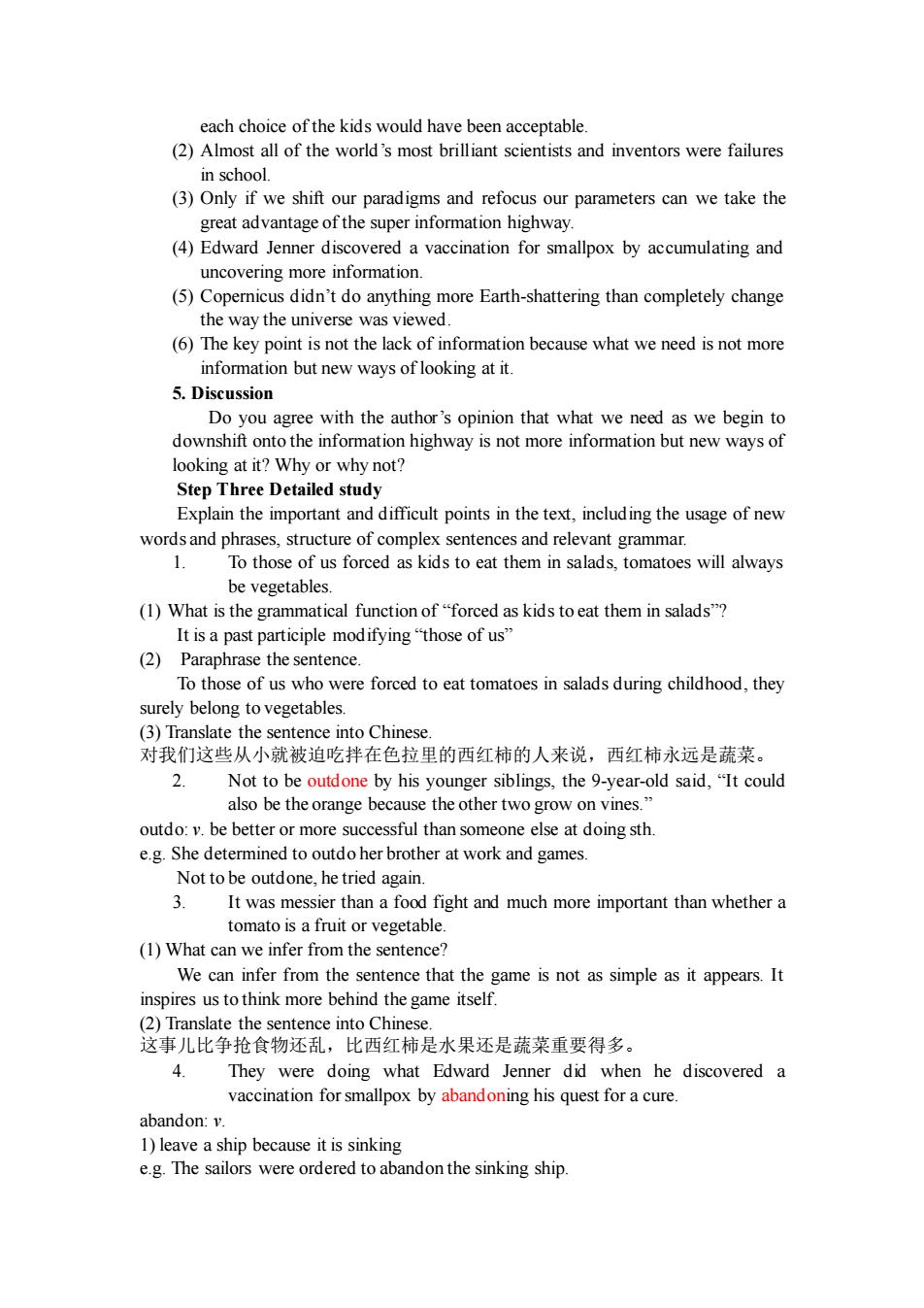
each choice of the kids would have been acceptable (2)Almost all of the world's most brilliant scientists and inventors were failures in school (3)Only if we shift our paradigms and refocus our parameters can we take the great advantage of the super information highway. (4)Edward Jenner discovered a vaccination for smallpox by accumulating and ore information (5)Copericus didn't do anything more Earth-shattering than completely change the way the universe was viewed. (6)The key point is not the lack of information because what we need is not more information but new ways of looking at it. 5.Discussion Do you agree with the author's opinion that what we need as we begin to downshift onto the information highway is not more information but new ways of looking at it?Why or why not? Step Three Detailed study Explain the important and difficult points in the text,including the usage of new words and phrases,structure of compl sentences and releva nt grammar 1 To those of us forced as kids to eat them in salads,tomatoes will always be vegetables. (1)What is the grammatical function of"forced as kids to eat them in salads"? It is a past participle modifying"those of us" 2) the se ntence Tothose ofus who were tomatoes nsads during childhood,they surely belong to vegetables. (3)Translate the sentence into Chinese 对我们这些从小就被迫吃拌在色拉里的西红柿的人来说,西红柿永远是蔬菜。 Not to be outdone by his y o be the orang because the thertsaid.I outdo:v.be better or more successful than someone else at doing sth e.g.She determined to outdo her brother at work and games. Not to be outdone,he tried again. It was messier than a food fight and much more important than whether a o is a fruit o vegetable (1)What can we infer from the sentence? We can infer from the sentence that the game is not as simple as it appears.It inspires us to think more behind the game itself. (2)Translate the sentence into Chinese 这事儿比争抢食物还乱,比西红柿是水果还是蔬菜重要得多】 They were doing what Edward Jenner did when he discovered a vaccination for smallpox by abandoning his quest for a cure. abandon:v. 1)leave a ship because it is sinking e.g.The sailors were ordered to abandonthe sinking ship
each choice of the kids would have been acceptable. (2) Almost all of the world’s most brilliant scientists and inventors were failures in school. (3) Only if we shift our paradigms and refocus our parameters can we take the great advantage of the super information highway. (4) Edward Jenner discovered a vaccination for smallpox by accumulating and uncovering more information. (5) Copernicus didn’t do anything more Earth-shattering than completely change the way the universe was viewed. (6) The key point is not the lack of information because what we need is not more information but new ways of looking at it. 5. Discussion Do you agree with the author’s opinion that what we need as we begin to downshift onto the information highway is not more information but new ways of looking at it? Why or why not? Step Three Detailed study Explain the important and difficult points in the text, including the usage of new words and phrases, structure of complex sentences and relevant grammar. 1. To those of us forced as kids to eat them in salads, tomatoes will always be vegetables. (1) What is the grammatical function of “forced as kids to eat them in salads”? It is a past participle modifying “those of us” (2) Paraphrase the sentence. To those of us who were forced to eat tomatoes in salads during childhood, they surely belong to vegetables. (3) Translate the sentence into Chinese. 对我们这些从小就被迫吃拌在色拉里的西红柿的人来说,西红柿永远是蔬菜。 2. Not to be outdone by his younger siblings, the 9-year-old said, “It could also be the orange because the other two grow on vines.” outdo: v. be better or more successful than someone else at doing sth. e.g. She determined to outdo her brother at work and games. Not to be outdone, he tried again. 3. It was messier than a food fight and much more important than whether a tomato is a fruit or vegetable. (1) What can we infer from the sentence? We can infer from the sentence that the game is not as simple as it appears. It inspires us to think more behind the game itself. (2) Translate the sentence into Chinese. 这事儿比争抢食物还乱,比西红柿是水果还是蔬菜重要得多。 4. They were doing what Edward Jenner did when he discovered a vaccination for smallpox by abandoning his quest for a cure. abandon: v. 1) leave a ship because it is sinking e.g. The sailors were ordered to abandon the sinking ship
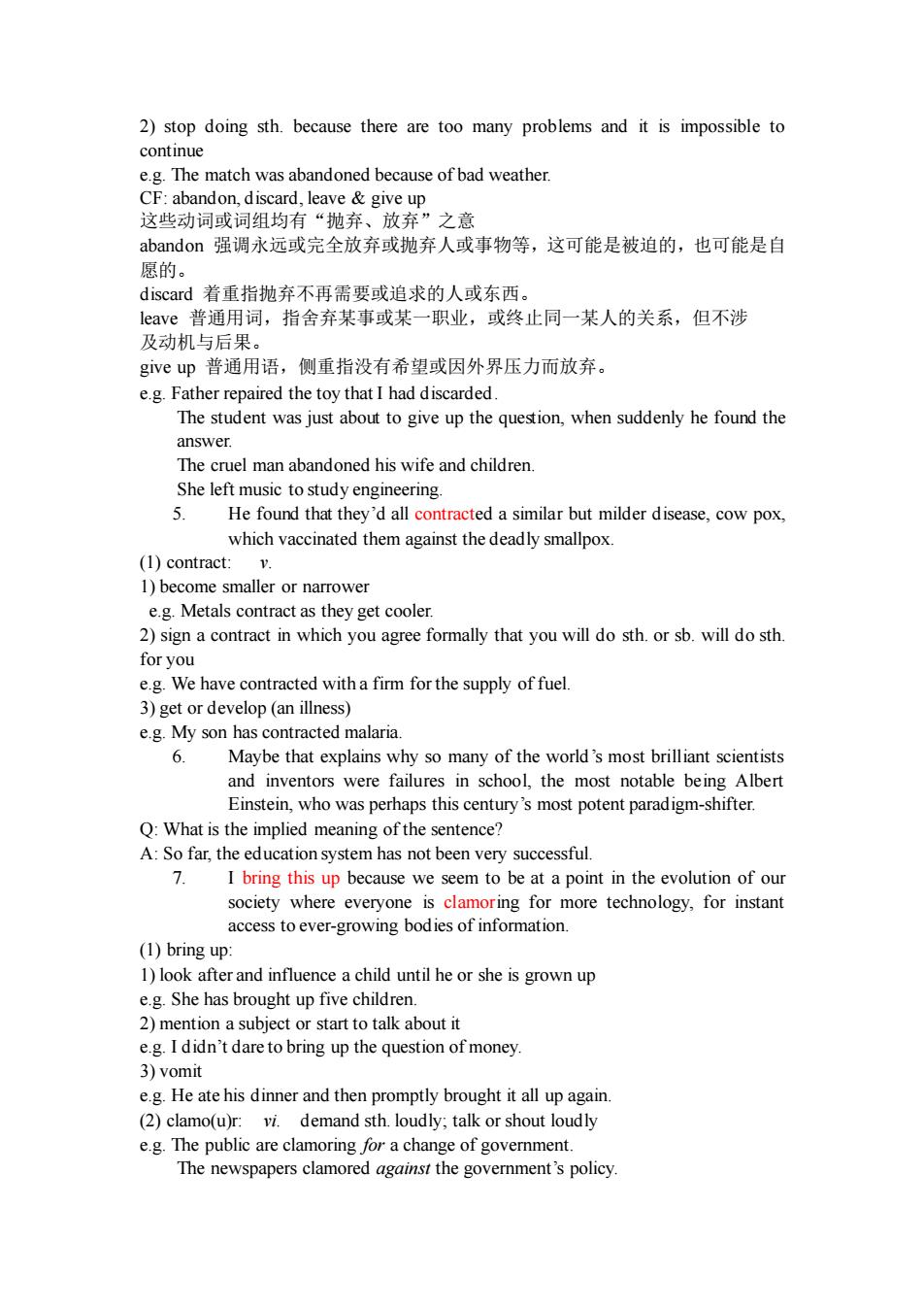
2)stop doing sth.because there are too many problems and it is impossible to e.g.The match was abandoned because of bad weather CF:abandon,d scard,leave give up 这些动词或词组均有“抛弃、放弃”之意 abandon强调永远或完全放弃或抛弃人或事物等,这可能是被迫的,也可能是自 鬼的。 discard着重指抛弃不再需要或追求的人或东西 leave 普通用词,指舍弃某事或某一职业,或终止同一某人的关系,但不涉 及动机与后果。 give up普通用语,侧重指没有希望或因外界压力而放弃。 answe The cruel man abandoned his wife and children. She left music to study engineering. He found that they'd all contracted a similar but milder disease.cow pox which vaccinated them against the deadly smallpox. (1)contract. 1)become smaller or narrower e.g.Metals contract as they get cooler. 2)sign a contract in which you agree formally that you will do sth.or sb.will do sth. for you e.g.We ha contracted witha firm for the supply of fuel 3)get or develop (an illness) e.g.My son has contracted malaria. 6 Maybe that explains why so many of the world's most brilliant scientists s this century' Q:What is the implied meaning of the sentence A:So far,the education system has not been very successful. 7 I bring this up because we seem to be at a point in the evolution of our society where everyone is clamoring for more technology,for instant access to ever-growing bodies of information. (1)bring up 1)look after and influence a child until he or she is grown up e.g.She has brought up five children. 2)mention a subiect or start to talk about it e.g.Ididn't dare to bring up the question of money e.g.He ate his dinner and then promptly brought it all up again (2)clamo(u)r:vi.demand sth.loudly;talk or shout loudly e.g.The public are clamoring for a change of government. The newspapers clamored against the government's policy
2) stop doing sth. because there are too many problems and it is impossible to continue e.g. The match was abandoned because of bad weather. CF: abandon, discard, leave & give up 这些动词或词组均有“抛弃、放弃”之意 abandon 强调永远或完全放弃或抛弃人或事物等,这可能是被迫的,也可能是自 愿的。 discard 着重指抛弃不再需要或追求的人或东西。 leave 普通用词,指舍弃某事或某一职业,或终止同一某人的关系,但不涉 及动机与后果。 give up 普通用语,侧重指没有希望或因外界压力而放弃。 e.g. Father repaired the toy that I had discarded. The student was just about to give up the question, when suddenly he found the answer. The cruel man abandoned his wife and children. She left music to study engineering. 5. He found that they’d all contracted a similar but milder disease, cow pox, which vaccinated them against the deadly smallpox. (1) contract: v. 1) become smaller or narrower e.g. Metals contract as they get cooler. 2) sign a contract in which you agree formally that you will do sth. or sb. will do sth. for you e.g. We have contracted with a firm for the supply of fuel. 3) get or develop (an illness) e.g. My son has contracted malaria. 6. Maybe that explains why so many of the world’s most brilliant scientists and inventors were failures in school, the most notable being Albert Einstein, who was perhaps this century’s most potent paradigm-shifter. Q: What is the implied meaning of the sentence? A: So far, the education system has not been very successful. 7. I bring this up because we seem to be at a point in the evolution of our society where everyone is clamoring for more technology, for instant access to ever-growing bodies of information. (1) bring up: 1) look after and influence a child until he or she is grown up e.g. She has brought up five children. 2) mention a subject or start to talk about it e.g. I didn’t dare to bring up the question of money. 3) vomit e.g. He ate his dinner and then promptly brought it all up again. (2) clamo(u)r: vi. demand sth. loudly; talk or shout loudly e.g. The public are clamoring for a change of government. The newspapers clamored against the government’s policy
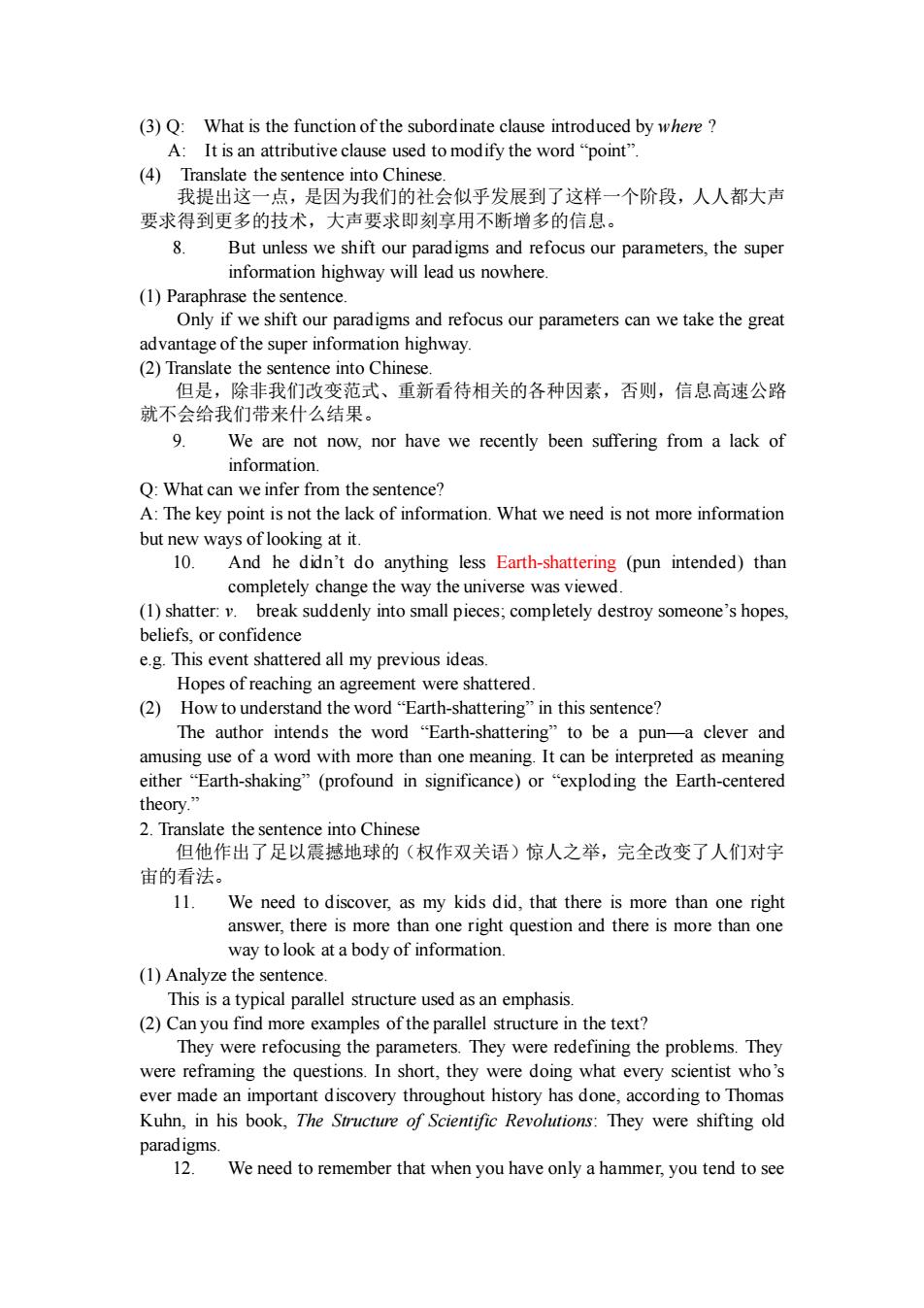
(3)Q:What is the function ofthe subordinate clause introduced by where? A:It is an attributive clause used to modify the word"point" (4 Translate the sentence into Chinese 我提出这一点,是因为我们的社会似乎发展到了这样 一个阶段,人人都大声 要求得到更多的技术,大声要求即刻享用不断增多的信息。 8 But unless we shift our paradigms and refocus our parameters.the super information highway will lead us nowhere (1)Paraphrase the sentence. Only if we shift our paradigms and refocus our parameters can we take the great advantage of the super information highway. (2)Translate the sentence into Chinese. 但是,除非我们改变范式、重新看待相关的各种因素,否则,信息高速公路 就不会给我们带来什么结果。 9 We are not now,nor have we recently been suffering from a lack of information. Q:What can we infer from the sentence? A:The key point is not the lack of information.What we need is not more information w ways of looking at it And he didn't do anything less Earth-shattering (pun intended)than completely change the way the universe was viewed. (1)shatter:v.break suddenly into small pieces;completely destroy someone's hopes, beliefs or confidence e.g.This event sha tered all my previous idea Hopes ofrea (2)How to understand the word"Earth-shattering"in this sentence? The author intends the word "Earth-shattering"to be a pun-a clever and amusing use of a word with more than one meaning.It can be interpreted as meaning either"Earth-shaking"(profo und in significance) or“exploding he Earth-center 2.Translate the se tence into Chinese 但他作出了足以震撼地球的(权作双关语)惊人之举,完全改变了人们对宇 宙的看法。 11 We need to disco .as my kids did,that there is more than one right one righ tquestion and there is more than one way to look at a body of information (1)Analyze the sentence This is a typical parallel structure used as an emphasis. (2)Can you find more examples of the parallel structure in the text? The th The redefi ing the problems.They were reframing the questions.In short,they were doing what every scientist who' ever made an important discovery throughout history has done,according to Thomas Kuhn,in his book,The Structure of Scientific Revolutions:They were shifting old paradigms. 12. We need to remember that when you have only a hammer,you tend to see
(3) Q: What is the function of the subordinate clause introduced by where ? A: It is an attributive clause used to modify the word “point”. (4) Translate the sentence into Chinese. 我提出这一点,是因为我们的社会似乎发展到了这样一个阶段,人人都大声 要求得到更多的技术,大声要求即刻享用不断增多的信息。 8. But unless we shift our paradigms and refocus our parameters, the super information highway will lead us nowhere. (1) Paraphrase the sentence. Only if we shift our paradigms and refocus our parameters can we take the great advantage of the super information highway. (2) Translate the sentence into Chinese. 但是,除非我们改变范式、重新看待相关的各种因素,否则,信息高速公路 就不会给我们带来什么结果。 9. We are not now, nor have we recently been suffering from a lack of information. Q: What can we infer from the sentence? A: The key point is not the lack of information. What we need is not more information but new ways of looking at it. 10. And he didn’t do anything less Earth-shattering (pun intended) than completely change the way the universe was viewed. (1) shatter: v. break suddenly into small pieces; completely destroy someone’s hopes, beliefs, or confidence e.g. This event shattered all my previous ideas. Hopes of reaching an agreement were shattered. (2) How to understand the word “Earth-shattering” in this sentence? The author intends the word “Earth-shattering” to be a pun—a clever and amusing use of a word with more than one meaning. It can be interpreted as meaning either “Earth-shaking” (profound in significance) or “exploding the Earth-centered theory.” 2. Translate the sentence into Chinese 但他作出了足以震撼地球的(权作双关语)惊人之举,完全改变了人们对宇 宙的看法。 11. We need to discover, as my kids did, that there is more than one right answer, there is more than one right question and there is more than one way to look at a body of information. (1) Analyze the sentence. This is a typical parallel structure used as an emphasis. (2) Can you find more examples of the parallel structure in the text? They were refocusing the parameters. They were redefining the problems. They were reframing the questions. In short, they were doing what every scientist who’s ever made an important discovery throughout history has done, according to Thomas Kuhn, in his book, The Structure of Scientific Revolutions: They were shifting old paradigms. 12. We need to remember that when you have only a hammer, you tend to see

every problem as a nail. ()What do“ah A hammer' here are used as two metaphors symbolizing th and“a nail' paradigms and the fixed patterns of thinking. 2.Paraphrase the sentence. If you look at things only in one way,most likely you will fail to see the nature of your prolem and consequently you won't be ableto sove it. V.Summary 1.Main idea of the text James Sollish,author of the present essay,leamned about the importance of creative thinking while playing the What Doesn't Belong game with his children.In rom his own children some of the ntist,he helps explain the nature of creative thinking and calls on the reader to think creatively. 2.Words and expressions V.Homework 1.Memorize the new words and phrases in the text. 2.Do exercises on p33-39 3.Learn the text in"Reading Activity"by yourself. 4.Write a composition about 120 words discussing how to cultivate the creative thinking VI.References 1.College English Intensive Reading 3,LinYinhua(ed.),Shanghai Foreign Language Education Press,2006. 2.College English Intensive Reading 3,(Teacher's Book),Zhang Zengjian(ed.), Shanghai Foreign Language Education Press,2006. 3.Oxford Adva erEnglish-Chinese Dictionary( university press&The C omm rcial Pr 00 4.大学英语语法.薄冰主编.山西:山西教育出版社,2006 5.大学英语实用语法讲解与练习.任福洪等主编。北京:国防工业出版社, 200 6.实用英语语法.张道真.北京:外语教育与研究出版社.2002
every problem as a nail. (1) What do “a hammer” and “a nail” refer to? “A hammer” and “a nail” here are used as two metaphors symbolizing the old paradigms and the fixed patterns of thinking. 2. Paraphrase the sentence. If you look at things only in one way, most likely you will fail to see the nature of your problem and consequently you won’t be able to solve it. V. Summary 1. Main idea of the text James Sollish, author of the present essay, learned about the importance of creative thinking while playing the What Doesn’t Belong game with his children. In the essay, with examples ranging from his own children to some of the world ’s greatest scientist, he helps explain the nature of creative thinking and calls on the reader to think creatively. 2. Words and expressions V. Homework 1. Memorize the new words and phrases in the text. 2. Do exercises on p33-39 3. Learn the text in “Reading Activity” by yourself. 4. Write a composition about 120 words discussing how to cultivate the creative thinking. VI.References 1. College English Intensive Reading 3, LinYinhua(ed.), Shanghai Foreign Language Education Press, 2006. 2. College English Intensive Reading 3, (Teacher’s Book), Zhang Zengjian(ed.), Shanghai Foreign Language Education Press, 2006. 3. Oxford Advanced Learner’s English-Chinese Dictionary(6 th edition), Oxford university press﹠The Commercial Press, 2004. 4. 大学英语语法. 薄冰 主编. 山西:山西教育出版社,2006. 5. 大学英语实用语法讲解与练习. 任福洪等主编. 北京:国防工业出版社, 2004. 6.实用英语语法. 张道真. 北京:外语教育与研究出版社. 2002